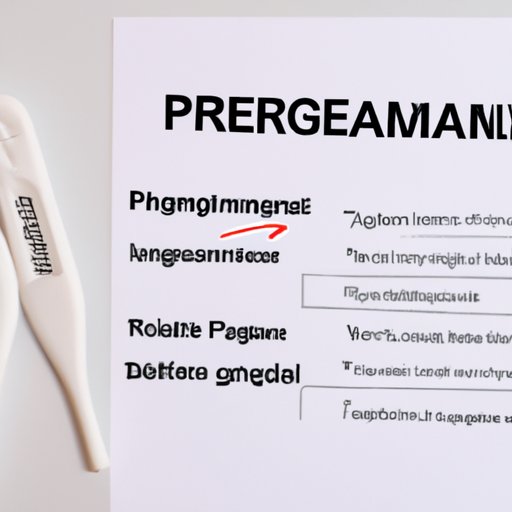
Introduction
For many women, the first signs of pregnancy can be difficult to detect and can be easily mistaken for other common health issues. However, there are several early signs and symptoms to look out for that can indicate you are pregnant. This guide will provide an in-depth look at the most common signs of pregnancy, types of pregnancy tests available, and how to prepare for a healthy pregnancy.
Symptoms to Look Out For
One of the most common signs that you may be pregnant is a missed period. However, there are several other symptoms to keep in mind when trying to determine if you’re pregnant.
Nausea and vomiting are common symptoms that are often referred to as morning sickness. While they typically occur in the first trimester, they can persist throughout the entire pregnancy for some women. Fatigue and exhaustion are also common symptoms that can happen as early as a few weeks after conception. Breast changes, including tenderness and swelling, can also occur as your body prepares to breastfeed.
Spotting or cramping, especially around the time when you would normally have your period, can also be a sign of pregnancy. These symptoms can occur during implantation when the fertilized egg attaches to the uterine lining.
Types of Pregnancy Tests
There are two main types of pregnancy tests available: at-home pregnancy tests and blood tests at the doctor’s office. At-home pregnancy tests can be purchased without a prescription and are easy to use. They typically require you to urinate on a stick and wait a few minutes for the results to appear. Blood tests at the doctor’s office are more accurate but require you to make an appointment with your healthcare provider.
It’s important to note that false negatives can occur with at-home pregnancy tests, so it’s recommended to confirm the results with a healthcare provider.
Early Signs of Pregnancy
There are several early signs of pregnancy besides a missed period. Sore or tender breasts, frequent urination, and nausea and vomiting can all be signs of pregnancy. Fatigue and exhaustion are also common early symptoms that can occur as early as two weeks after conception.
If you are experiencing any of these symptoms, it’s important to consult your doctor for confirmation and medical advice.
Common Misconceptions
There are many common misconceptions about getting pregnant. For example, some people believe that you can’t get pregnant on your period or that you can only get pregnant if you have an orgasm. It’s important to separate fact from fiction when it comes to getting pregnant to ensure you make informed choices.
It’s also important to consult your healthcare provider if you have any questions or concerns about your reproductive health.
Talking to Your Doctor
If you suspect you’re pregnant, it’s important to speak with your healthcare provider as soon as possible. Your doctor can confirm a pregnancy, provide information on prenatal care, and address any concerns you may have.
When making your appointment, make sure to communicate any symptoms you are experiencing and any questions you may have clearly and effectively to ensure you receive the best care possible.
Pregnancy and Your Body
Pregnancy impacts your body in many ways. Hormonal changes can lead to mood swings and changes in appetite. Weight gain is also a common occurrence during pregnancy, and it’s important to maintain a healthy and active lifestyle to ensure you and your baby stay healthy.
Pregnancy can also impact other parts of your body, including your skin and hair. Stretch marks may appear, and some women may experience acne or changes in hair texture.
Preparing for Pregnancy
If you are planning to get pregnant, there are several steps you can take to optimize your health and lifestyle. Eating a healthy and balanced diet, exercising regularly, and managing stress can all help prepare your body for a healthy pregnancy.
It’s also important to consult your healthcare provider before trying to conceive to ensure any pre-existing health issues are managed effectively.
Conclusion
Knowing the signs and symptoms of pregnancy can help you make informed choices when it comes to your reproductive health. If you suspect you may be pregnant, it’s important to speak to your healthcare provider for confirmation and advice.
By taking care of your body and staying informed, you can prepare for a healthy and fulfilling pregnancy.




